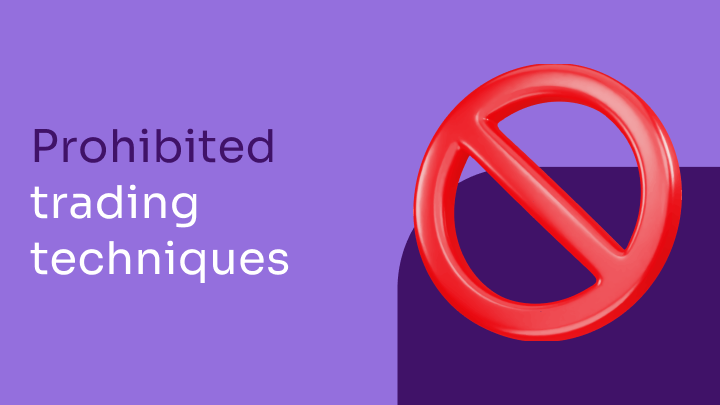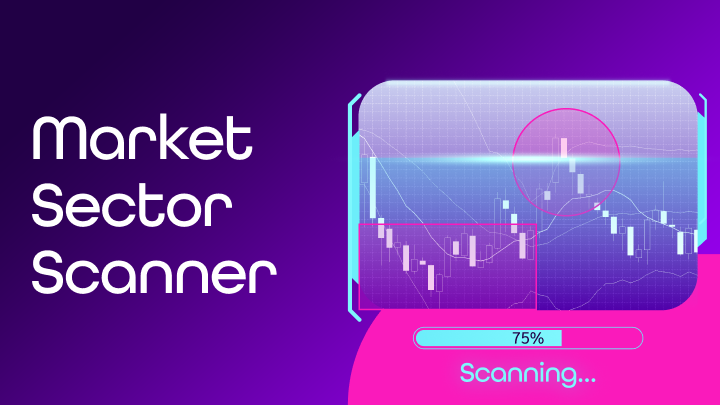Trading practices that won’t get you far at Fintokei
At Fintokei, we're all about opening up big opportunities to level up your trading game. But there are still some rules you have to play by.

We started Fintokei to help aspiring traders like you make it big in the trading world. Whether you’re lacking in knowledge, skills, or just capital to start trading, we’ve got your back.
Our mission is to teach you how to trade smartly—following a plan and keeping your emotions in check. If you nail this approach, there’s plenty of room for you to grow with us. But hey, there are still some ground rules we need you to stick to.
Modern prop trading draws in all sorts of traders. Some are genuinely eager to learn the ropes, analyze markets, and minimize losses. Others are just in it for the big payouts, not caring much about the journey. At Fintokei, we are aware of various such “speed traders” that’s why we have compiled a list of prohibited trading techniques and practices that lean closer to gambling than real trading.
Why aren’t these practices allowed in Fintokei?
It’s crucial to understand that our business relies on the expertise of conscientious and trustworthy traders. We aim to monetize the trading data provided by our clients in the real market. Additionally, we’re keen on offering professional partnerships to these traders.
Given that the trading practices outlined in this article often resemble gambling or even fraud, they simply don’t fit our model. So beware of engaging in such practices as it can put you in a risk of losing your account or breaching a trading challenge.
Practices We Don’t Tolerate at Fintokei
Copying Other People’s Signals
If we’re aiming to discover and cultivate genuine trading talent and prepare traders to handle real investor capital, we simply cannot tolerate copytrading. Imagine being an investor who entrusts significant funds to someone only to find out they’re just mimicking others’ trades.
At Fintokei, we strictly prohibit copying signals from other traders or allowing third parties to manage accounts. Engaging in these practices will result in immediate account termination.
✅ Similar Technique Allowed: Copying your own trades
However, if you manage your own account with a broker and simply replicate your own trades onto a trading account at Fintokei, that’s perfectly fine. Just be aware that we reserve the right to verify the ownership of the account from which trades are copied.
Use of Trading Robots Created to Pass a Challenge
While we do permit certain standard Expert Advisor systems (EAs) at Fintokei (more details on these later), we draw the line at robots crafted solely to pass a trading challenge.
These so-called High-Frequency Trading (HFT) robots are designed to churn out a massive number of trades in record time. Not only does this strain the servers running prop trading company accounts, but it also poses a hidden issue.
HFT robots are often engineered to help users breeze through the first round of a trading challenge, only to mysteriously malfunction in subsequent rounds. Developers of these HFT robots then attribute these glitches to minor bugs, promising quick fixes and urging users to try (and buy) again. But there’s a catch: all profits from these endeavors end up lining the pockets of the prop trading company, which conveniently permits HFT.
We’ll leave it to you to decipher the relationship between HFT robot creators and prop trading firms, along with the realization that you’ll likely pay more cash for a similar robot than for one of our ProTrader challenges.
Let’s be crystal clear: the use of HFT or similar robots is strictly prohibited at Fintokei and will result in immediate account termination.
Tick Scalping
Let’s discuss tick scalping. This strategy involves rapidly entering and exiting trades to capitalize on small price movements known as ticks. However, engaging in excessive tick scalping can result in the closure of your Fintokei account. While we aim to replicate our traders’ successful trades in real market conditions, tick scalping presents challenges due to slippage issues.
For a trade to be classified as tick scalping, it must have a duration of less than 15 seconds. Trades lasting longer than this are considered standard scalping, which is permissible.
It’s important to note that inadvertently executing a trade lasting 15 seconds or less does not automatically classify you as a tick scalper.
A trader is identified as a tick scalper if:
- They consistently open trades lasting less than 10 seconds.
- These trades account for over 10% of their total trading volume on any given day.
Exceeding the 10% threshold on a single day will result in a warning. Continued breaches may lead to account termination. If a trader’s tick scalping volume exceeds 50% in a day, the account will be immediately closed without further recourse.
Hedging Across Multiple Accounts and Clients
We agree that hedging positions across multiple accounts might sound kinda smart, but at Fintokei, we’re all about talent, not just any old trickster 🙂 When two traders in two different accounts team up and place identical trades but in opposite directions, sharing any profits or costs, it’s not exactly what we’re after in terms of trading talent – especially when we’re talking about handling real investor cash.
✅ Similar Technique Allowed: Standard Price Averaging
Now, opening opposite positions in the same trading instrument within the same account? That’s just good risk management. It helps keep traders and investors safe from any nasty surprises in the market. And that kind of hedging is perfectly okay with us.
Creating New Accounts with Different Email Addresses
Gambling traders often try to bypass our rules. Instead of reflecting on their risky trading habits and aiming to trade like real professionals, they look for ways to continue gambling. Since our monitoring system links clients to their email addresses, they see a simple solution: create new accounts with different email addresses and keep going.
That’s why at Fintokei, we’ve decided to treat creating new accounts under different email addresses than the original one as a prohibited practice.
✅ Similar Technique Allowed: Unlimited Accounts Linked to One Email
We don’t want to stop our traders from opening new accounts or taking on new challenges. Diversifying risk is actually a very smart strategy. Many of our traders pass the evaluation with two accounts and then switch between them. If one account gets too close to the drawdown limit, they move to the other and let the risky one cool off. It’s often a better approach than burning an account, starting a new challenge, and repeating the cycle. This way, traders stay in control while following the rules.
Sharing 1 electronic device used for trading between multiple customers
At Fintokei, each trader is expected to use their own personal device for trading. Your account activity should come from devices (laptop, phone, VPS) that aren’t shared with other clients. Device sharing means multiple traders logging in to their Fintokei accounts from the same physical device—such as a shared laptop, desktop, or VPS—even if they use separate logins.
This practice is not allowed, as it can be used to bypass allocation limits, suggests possible copy trading or coordinated activity, and complicates KYC verification and risk monitoring.
You’re free to trade from multiple personal devices.
As long as only you are using them. Using your own VPS is also permitted, but it must not be shared with other traders.
Using multiple IP addresses from many countries when connecting to your Fintokei Demo accounts or masking the IP addresses
Fintokei monitors the IP addresses used to access your trading accounts to ensure fair usage and protect the platform from abuse, identity fraud, or manipulation. If we notice unusual IP patterns—like logins from multiple countries in a short time span or masked locations via VPNs, proxies, or anonymizers—it may raise concerns and result in account restrictions or even a breach of our terms.
You may be in violation of our policy if you regularly switch between IP addresses from different countries without clear travel history, use tools to deliberately hide your IP, or trade from a server in one country while being registered in another—without explanation. Occasional travel or using your own VPS is fine, as long as your activity remains consistent and transparent. Deliberate masking or location manipulation, however, undermines platform integrity and may be treated as a serious violation.
Unauthorized third-party payments
At Fintokei, every trader must manage and pay for their own account using their own identity and payment method. Any payment made by someone else on your behalf is strictly prohibited. This is what we refer to as unauthorized third-party payment.
What’s not allowed? Using someone else’s credit card, crypto wallet, or any other payment method to purchase a challenge in your name. Having a friend, family member, team, or organization pay for your account directly (unless it’s via our official Voucher system) is also forbidden. Acting as a “middleman” to buy accounts for other traders is a clear violation. Even if the intent seems harmless, this behavior bypasses our KYC checks, enables abusive schemes, and compromises our ability to fairly evaluate individual trader performance. Every trader must be fully verified and financially responsible for their own account.
These trading techniques are perfectly okay with us!
Since we don’t want to wrap up on a negative tone and dwell solely on bans and prohibitions, let’s explore the techniques and practices that are permitted here at Fintokei. It’s worth noting that while our competitors often impose bans or restrictions, we take a different approach.
Trading News
Fundamental analysis – the real cornerstone of trading. When handled correctly it can pave the way for some serious profits. Here at Fintokei, if you know of some upcoming market event, you’re free to ride the volatility wave caused by big news releases, no strings attached. Unlike some other big prop trading companies, we don’t put the brakes on news trading.

Standard Trading Robots/EAs
Now, when it comes to trading robots, we’ve got a mixed bag. While we’re not fans of those super-fast HFT robots or ones designed to ace trading challenges, we really don’t mind the other types. Think robots that help you set Stop Loss or Take Profit levels, make entering positions a breeze, or improve your old MT4 platform. Bottom line? We do not ban EAs across the board at Fintokei.



